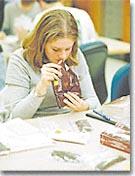
Student Sleuths
Sherlock Holmes' cases help Wake Forest freshmen
learn to think and debate

NOSING AROUND:
Cyndi Pleatman tries to identify the
aromas of different brands of tobacco.
(Journal Photo By Christine Rucker)
By Soyia Ellison
JOURNAL REPORTER
What do pipe tobacco, cryptograms and sugar water have in
common?
Elementary, my dear Watson.
They are all key ingredients in ''The Analytical Methods of
Sherlock Holmes,'' a freshmen seminar class at Wake Forest
University taught by chemistry professor Brad Jones. Jones is
using the super sleuth to teach his 15 students a little about
chemistry and a lot about critical thinking and argument analysis.
''It's a good chance for me to get away from the normal chemistry
lecture and talk about what I love,'' he said. ''You go to an
introductory chemistry class and no one is smiling. Sometimes I
worry that I'm boring myself.
''I think chemistry has lost its romance. Back when Sherlock
Holmes was popular, it was exciting to be a chemist -- to live by
your wits.''
Jones hopes his students will pick up his enthusiasm for the
science.
But the purpose of the first-year seminar is to teach freshmen to
think and debate. Other seminar topics include Medical Ethics,
Women and the Arts, International Film Directors, New World
Orders and Songs of Protest.
The Holmes class is a mix of writing assignments and experiments.
Students will read four novels and about 30 short stories by the
end of the semester. They have studied Holmes' view of women
and of God. They have learned to identify fingerprints and to solve
cryptograms like Holmes did in ''The Adventure of the Dancing
Men.'' They have analyzed Watson, who is sometimes thought of
as a bumbler.
''I think we decided that he's really an intelligent man who looks
like an idiot because he's paired with Sherlock Holmes,'' Jones
said.
''Another subject has been Sherlock Holmes' use of drugs. I
introduced a story where he used cocaine the first week of class,
and most of the students were shocked.''
Holmes prepared a 7 percent solution of cocaine and water and
injected it to stave off boredom in between cases.
The students prepared their own 7 percent solution -- substituting
sugar for cocaine. For their midterm, they profiled one of Holmes'
detection methods and predicted how it would hold up in today's
courtroom.
''In general, most of their opinions were that his methods wouldn't
hold up in court,'' Jones said. ''I don't know if that's true. I think
things are tainted by the O.J. Simpson case.''
Jones said that he doesn't spend much time preparing for the class.
He re-reads the stories the students are reading, comes up with a
few questions to get things started, and lets the discussion rip.
''My favorite part has been listening to the students discuss
Sherlock Holmes and what they think of him,'' he said.
''Sometimes I have to focus it, because we'll get all the way from
Sherlock Holmes to JFK's assassination.''
The students tend to be skeptical that a real person could
duplicate Holmes' feats, he said.
''I tend to believe it's possible more than they do.''
Holmes claimed that he could identify 144 kinds of pipe tobacco,
Jones said.
In a story called ''The Adventure of Black Peter,'' a seaman is
found harpooned to a wall. Beside him lies a tobacco pouch
bearing his initials, but there is no pipe in his room. Holmes
deduces that Peter didn't smoke, and, by identifying the type of
tobacco in the pouch, nails the killer.
Jones gave students a chance to test their tobacco-detection skills
during a recent class.
He gave each student a bag filled with pipe tobacco. They had to
figure out what brand they had by comparing the contents of their
bags with the 11 pouches of tobacco scattered around the room.
''Can we roll one up and smoke it?'' one student asked.
''Better not,'' Jones answered.
Some of the students poked their noses in the bags and came up
coughing. Others got a little help from a microscope.
''We have to describe all the ones we look at?'' another asked.
''I think I would, yeah.''
''There's no way there's, like, 11 different smells.''
Jones watched them work.
''I've tried some really innovative things -- some that have worked
very well and some that have really flopped,'' he said. ''I have no
idea how long this will take.''
Whatever the outcome, he said, he hopes they have a good time.
''I think it's important to have one fun class, and I try to make this
one fun. I hope it's something they will remember.''
Published: November 19, 1998